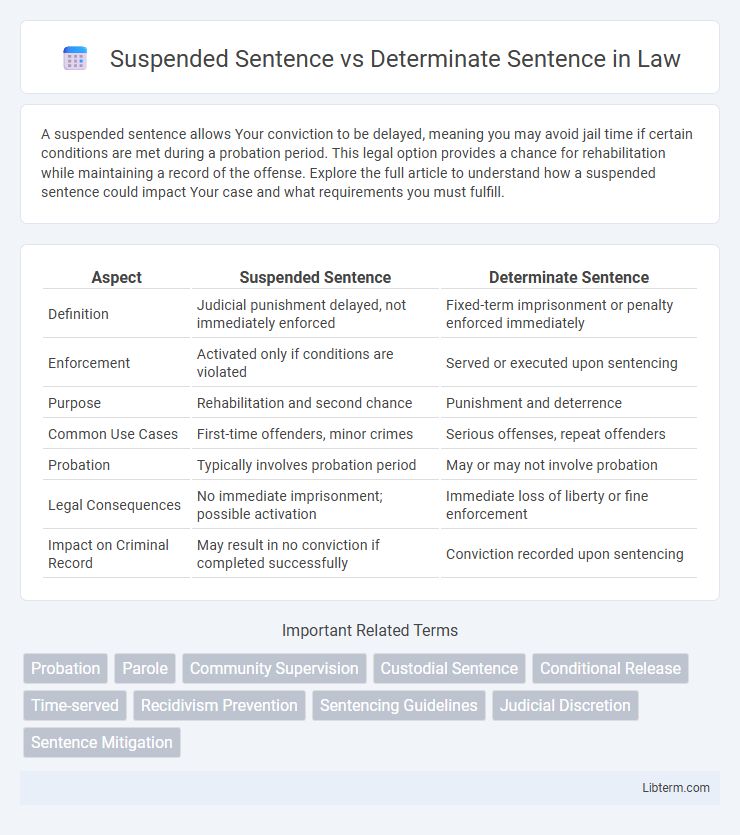A suspended sentence allows Your conviction to be delayed, meaning you may avoid jail time if certain conditions are met during a probation period. This legal option provides a chance for rehabilitation while maintaining a record of the offense. Explore the full article to understand how a suspended sentence could impact Your case and what requirements you must fulfill.
Table of Comparison
| Aspect | Suspended Sentence | Determinate Sentence |
|---|---|---|
| Definition | Judicial punishment delayed, not immediately enforced | Fixed-term imprisonment or penalty enforced immediately |
| Enforcement | Activated only if conditions are violated | Served or executed upon sentencing |
| Purpose | Rehabilitation and second chance | Punishment and deterrence |
| Common Use Cases | First-time offenders, minor crimes | Serious offenses, repeat offenders |
| Probation | Typically involves probation period | May or may not involve probation |
| Legal Consequences | No immediate imprisonment; possible activation | Immediate loss of liberty or fine enforcement |
| Impact on Criminal Record | May result in no conviction if completed successfully | Conviction recorded upon sentencing |
Introduction to Suspended and Determinate Sentences
A suspended sentence allows the court to delay the imposition or execution of a sentence, often placing the defendant on probation under specific conditions. In contrast, a determinate sentence is a fixed prison term with a defined length, leaving no room for suspension or delay. Suspended sentences are primarily used to encourage rehabilitation while determinate sentences focus on punishment and ensuring a set period of incarceration.
Definition of Suspended Sentence
A suspended sentence is a judicial punishment where the imposition or execution of the sentence is delayed or withheld, provided the defendant meets certain conditions or probation terms. Unlike a determinate sentence, which involves a fixed and definite period of imprisonment or penalty that must be served, a suspended sentence allows the offender to avoid incarceration if they comply with court-ordered requirements. This legal mechanism aims to promote rehabilitation and reduce prison overcrowding by offering offenders a chance to demonstrate good behavior.
Definition of Determinate Sentence
A determinate sentence refers to a fixed-term punishment imposed by a court, where the duration is explicitly set and cannot be altered by parole boards or judicial discretion. Unlike a suspended sentence, which delays imprisonment contingent on good behavior or other conditions, a determinate sentence requires the offender to serve the full term or face specific consequences. This type of sentencing provides clear guidelines on the length of incarceration, ensuring predictability and consistency in the criminal justice system.
Key Differences Between Suspended and Determinate Sentences
Suspended sentences are court orders where the imposition or execution of the sentence is delayed, allowing the defendant a probation period to demonstrate good behavior, whereas determinate sentences involve fixed imprisonment terms imposed without delay. Key differences include the immediate enforcement of determinate sentences versus conditional enforcement in suspended sentences, with the latter often used to promote rehabilitation and reduce prison overcrowding. Suspended sentences may be revoked upon violation of probation conditions, converting into determinate sentences, highlighting their conditional nature contrasted with the definitive and enforceable term of determinate sentences.
Legal Criteria for Imposing Suspended Sentences
Legal criteria for imposing suspended sentences typically include the offender's first-time status, the nature and severity of the crime, and the likelihood of rehabilitation without incarceration. Courts assess factors such as absence of prior criminal record, demonstrated remorse, and the potential risk to public safety when deciding to suspend a sentence. Suspended sentences often aim to encourage reform while reserving imprisonment for more serious or repeat offenders.
Legal Criteria for Imposing Determinate Sentences
Determinate sentences are imposed based on clear legal criteria such as the gravity of the offense, prior criminal record, and statutory mandates that require fixed imprisonment periods. Sentencing guidelines often emphasize public safety, deterrence, and the need for proportional punishment in determining the length and terms of a determinate sentence. Unlike suspended sentences, determinate sentences do not allow for immediate release or probation and must be fully served unless altered by parole or commutation.
Benefits of Suspended Sentences
Suspended sentences offer the benefit of allowing offenders to avoid immediate incarceration by deferring the imposition of the sentence, often contingent on good behavior or compliance with specific conditions. This approach supports rehabilitation by enabling individuals to maintain employment and family ties, which are critical factors in reducing recidivism rates. Courts use suspended sentences as a tool to promote restorative justice while alleviating prison overcrowding and lowering correctional system costs.
Drawbacks of Determinate Sentences
Determinate sentences impose fixed prison terms that limit judicial flexibility and often result in overcrowded correctional facilities, contributing to higher incarceration costs. These sentences can hinder rehabilitation efforts by not accounting for individual circumstances, potentially leading to higher recidivism rates. The rigid structure of determinate sentencing restricts opportunities for early release based on good behavior or progress, reducing incentives for inmates to engage in positive change.
Impact on Offenders: Rehabilitation and Recidivism
Suspended sentences offer offenders an opportunity for rehabilitation by delaying incarceration and emphasizing community-based programs that address root causes of criminal behavior, often reducing recidivism rates. Determinate sentences, which impose fixed prison terms, may limit access to personalized rehabilitation but provide a clear timeframe for punishment and reintegration planning. Studies show that suspended sentences are more effective in promoting behavioral change and lower reoffense rates compared to determinate sentences due to their focus on supervision and therapeutic interventions.
Conclusion: Choosing the Appropriate Sentence
Choosing between a suspended sentence and a determinate sentence depends on factors such as the offender's criminal history, the severity of the crime, and potential for rehabilitation. A suspended sentence offers the opportunity for probation and avoidance of incarceration if conditions are met, making it suitable for first-time or low-risk offenders. In contrast, a determinate sentence ensures a fixed period of imprisonment, reflecting the seriousness of the offense and prioritizing public safety through defined punishment.
Suspended Sentence Infographic

 libterm.com
libterm.com